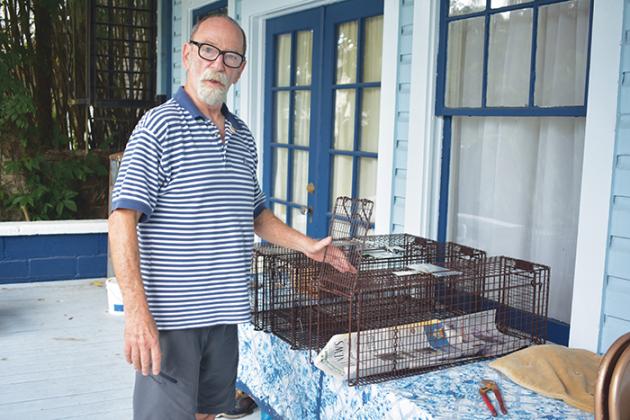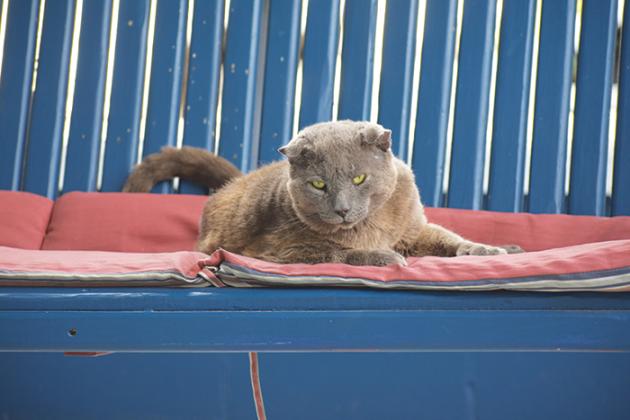After years of caring for stray cats in his neighborhood, a Palatka man has partnered with an animal sanctuary to trap, fix and release feral felines to control the pet population and reduce illness risks.
Every Monday, Wes Tuten sets three cat traps within 12 blocks of the South Historic District he calls home. Once Tuten catches the cats and verifies they haven’t been spayed or neutered, he takes them to Flagler Cats in Bunnell to be fixed for as low as $25 per cat, he said.
Tuten, who has been feeding stray cats in the neighborhood for about a decade, began trapping cats a few years ago.
It wasn’t until the beginning of August 2022, Tuten said, that he partnered with the Pomona Park-based Useless Animal Farm Sanctuary, which pays to have the cats he catches spayed and neutered.
“I started years ago, probably, with a couple of ladies in the neighborhood,” Tuten said. “We started feeding a cat, probably, 10 years ago. Then there was another cat.”
Last week, Tuten estimated he has captured about 70 cats to be fixed since he partnered with the animal sanctuary.
He said his capture-and-release program reduces the number of stray cats in the neighborhood. The cats also get shots to protect them from diseases that more heavily affect feral cats.
Getting cats fixed also improves their moods, Tuten said, having seen a 180-degree shift in the demeanor of Cauliflower, a stray cat that maintains a frequent presence at his home.
“There was this one really nasty cat,” he said of Cauliflower. “He was the meanest male in the neighborhood. And now, he sleeps in (my housemate’s) lap. It’s like night and day.”
Rosemary “Ode” Spear knows how aggressive feral male cats can be and how that combativeness can endanger stray cats. Spear and her husband, Larry Spear, own the Pomona Park land that houses the Useless Animal Farm Sanctuary.
Because of higher levels of testosterone, she said, male cats are more likely to fight each other. The injuries they sustain could get infected and lead to other ailments – or even death.
Female strays who don’t get spayed already have tough lives and shorter life expectancies, Rosemary Spears said, but having to take care of a litter causes more problems.
She praised the work Tuten does, expressing relief that the number of strays is decreasing and being thankful for the shots the cats get that protect them against feline leukemia, feline immunodeficiency virus, rabies and other diseases.
“The female cats don’t worry about taking care of a litter,” Spear said about the fixed animals. “The male cats aren’t hormonal.”
Spear – who used to work with the Humane Society of Northeast Florida in Hollister, which eventually became S.A.F.E. Pet Rescue – co-founded the Useless Animal Farm Sanctuary with her husband in 2001 to cater to farm animals in need.
The sanctuary, which isn’t open to the public, assists donkeys, goats, pigs and other farm animals. But it can also help pets, Spear said, which is why she wanted to work with Tuten.
The two met at Elsie Bell’s Antique Mall in Palatka, where Tuten has a part-time job and Spear operates a booth.
“I know what he was trying to do on his own,” Spear said about Tuten’s mission to catch and fix cats. “I’ve seen the problem personally. We just stuck with Wes, and he’s doing a great job.
“He’s just a super guy. It’s cut back on the kitten population. It’s cut back on the diseases that are associated with feral cats.”
Tuten said his program is a big help for his neighborhood considering how many cats he’s seen in the area.
He said he’s counted 50 stray cats on the 400 block of Emmett Street, where he lives, and counted 128 strays in the South Historic Neighborhood District.
While many residents feed the stray cats that peruse the neighborhood, he said, they were also concerned with the increasing number of cats they noticed before the catch-and-fix effort began, Tuten said.
“I think every neighborhood has a small problem (with stray cats),” he said. “We literally have people throw their cats out their windows as they pass by.”
Tuten doesn’t know how long he will continue to work with the animal sanctuary to get cats spayed and neutered. He has considered stopping after hitting a milestone number, but he also wants to surpass it.
Tuten encouraged people to donate to the Useless Animal Farm Sanctuary so they can keep getting cats fixed for as long as they continue their efforts. To donate or learn more about the sanctuary, visit the Useless Animal Farm Sanctuary Facebook page.
“I set myself a goal of 100 (cats trapped and fixed),” he said, “but Ode told me I can do it as long as I wanted to do it.”



